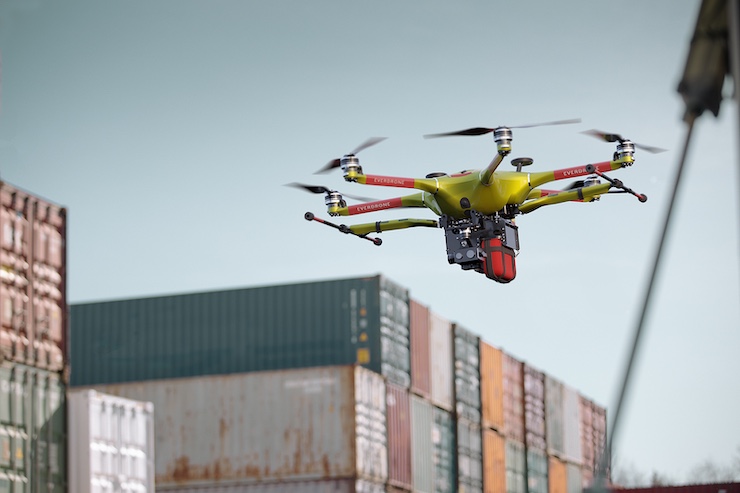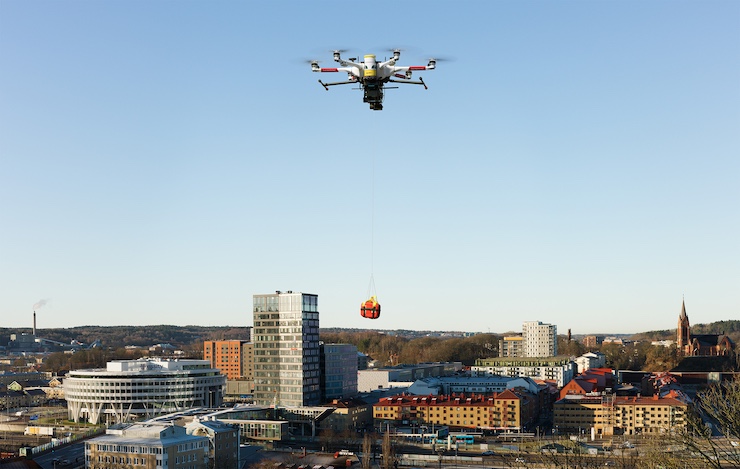Drone Defibrillator Delivery Could Save Lives in Sweden and UK Trials

© Everdrone.com
When most people think of drones being used to deliver items, they think of scenarios like receiving packages from retailers such as Amazon or food from services like DoorDash. While commercial drone deliveries are starting to gain traction, the majority of drone deliveries serve medical fields. For several years, companies such as Zipline, Matternet, and SwoopAero have been refining the logistics behind drone-based deliveries.
Medical drone deliveries transport items such as blood, vaccines, medications, tissue samples, and even organs between medical campuses. If a doctor at a hospital or clinic needs to send a blood sample to a lab, it can be securely packed in a drone and transported to a nearby lab in a fraction of the time and cost it would take a ground courier. In the early 2020s, paramedic and Research Affiliate Andreas Claesson from Karolinska Institutet recognized that drones could be used for more than scheduled hospital-to-lab transport.
Testing Defibrillator Delivery in Sweden
Claesson focused on one of the most time-sensitive medical emergencies, sudden cardiac arrest. His reasoning was simple but critical. For every minute a patient goes without defibrillation, their chance of survival drops by roughly ten percent. In many cases, ambulances arrive too late, especially in rural communities or areas where traffic creates unavoidable delays.
To test whether drones could close that gap, Claesson launched a program in which automated external defibrillators (AEDs) were dispatched by drone to simulated cardiac arrest scenarios. He carefully measured drone flight times against traditional ambulance response times. The results showed that drones consistently arrived minutes faster, a difference that can mean the line between life and death. As Claesson explained:
“This study clearly shows that unmanned aircraft, drones, show great potential in being able to deliver a defibrillator long before an ambulance arrives, particularly in remote areas.”
Building on those early trials, Claesson’s research has evolved into a permanent drone defibrillator delivery program in Sweden. Collaborating with Everdrone, a Swedish drone company, he helped integrate AED deliveries into the emergency medical response system in Sweden. This program, operational since 2020, dispatches drones equipped with AEDs to cardiac arrest incidents, reducing response times and potentially saving lives. “Our drone system has been operational for over a year, delivering defibrillators to cardiac arrest patients in Gothenburg,” said Mats Sällström, CEO of Everdrone. “The integration with emergency services has been seamless, and the results have been promising.”

© Everdrone.com
NHS Trials in the United Kingdom
Now, the United Kingdom has begun testing its own defibrillator delivery drones under the guidance of the National Health Service (NHS). The trials are taking place in rural parts of England and Scotland, where long ambulance response times make cardiac arrests particularly deadly. The project brings together researchers from the University of Warwick, the Civil Aviation Authority, and NHS ambulance trusts, with additional support from government innovation funds that prioritize drone technology for healthcare.
The drones being tested are fixed-wing models with vertical takeoff and landing (VTOL) capabilities, allowing them to travel long distances while carrying a defibrillator securely. They are equipped with live communication systems that link directly to emergency services during a 999 call, ensuring coordination between dispatchers, drone operators, and first responders on the ground.
Dr. Christopher Smith, a consultant in emergency medicine, is one of the project’s principal investigators. He has emphasized that the goal is not to replace ambulances but to buy critical minutes for patients before paramedics arrive. “We’ve built a drone system to deliver defibrillators to people having cardiac arrest, which could help save lives,” he said. “We have demonstrated that drones can safely fly long distances with a defibrillator attached and maintain real-time communications with emergency services during the 999 call. We are in a position where we could operationalise this system and use it for real emergencies across the UK soon.”
Drones Moving Beyond Convenience
While many people may be most excited about the prospect of receiving packages or meals by drone, the programs in Sweden and the United Kingdom show how this technology can have a far greater impact. Drones delivering automated external defibrillators directly to cardiac arrest victims demonstrate that the real potential of unmanned aircraft lies in saving lives. By reducing response times and bringing critical medical equipment to patients before ambulances can arrive, these programs highlight how drones are moving beyond convenience and into a role that can genuinely change outcomes in emergencies.
|